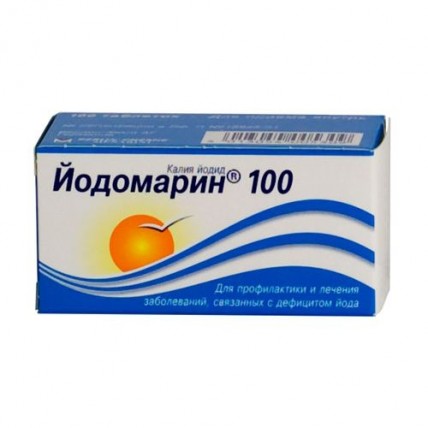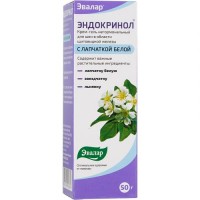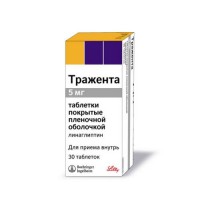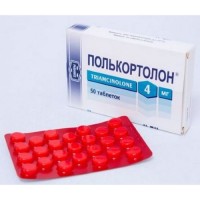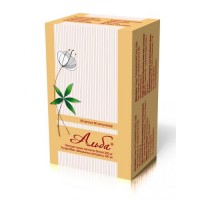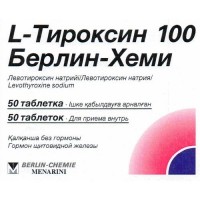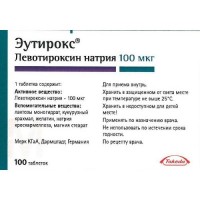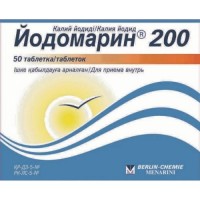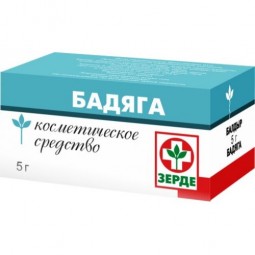Jodomarin 100 mcg (100 tablets)
- $10.20
The instruction for medical use
of Йодомарин® 100 medicine
the Trade name
Йодомарин® 100
International unlicensed name
Are not present
the Dosage form
of the Tablet of 100 mkg
Structure
One tablet contains
active agent – potassium iodide of 0.131 mg (0.100 mg of iodine are equivalent)
excipients: lactoses monohydrate, magnesium carbonate easy, gelatin, sodium carboxymethylstarch (type A), silicon dioxide colloidal anhydrous, magnesium stearate.
The description
of the Tablet of white or cream-white color, with a flat surface, with a facet and risky on one party.
Pharmacotherapeutic group
Drugs for treatment of diseases of a thyroid gland. Iodine drugs. The ATX H03CA code
the Pharmacological
Pharmacokinetics Usually properties iodine gets to an organism through digestive tract, but can arrive also through skin and from perigastriums. It needs to be considered especially at wrong medicamentous administration of iodine. At intake it is quickly soaked up from digestive tract. It is widely distributed in all fabrics and fluid mediums of an organism.
Inorganic iodine is soaked up in a small intestine nearly 100%, and through skin – is insignificant and uncontrollable. Distribution volume at healthy people averages about 23 liters (38% of body weight). Indicators of content of inorganic iodine in blood serum usually are in an interval between 0.1 and 0.5 mkg/dl. In an organism iodide collects in a thyroid gland and other fabrics, such as sialadens, chest glands and stomach. In saliva, gastric juice and in milk the concentration of iodide is 30 times higher than its concentration in blood plasma. The removal of iodine with urine specified most often in creatinine mkg/g serves as criterion of iodic providing as in the balanced state it corresponds to daily intake of iodine with food.
The Action pharmacodynamics which renders it is exogenous the entered iodine on a human body, depend on the accepted amount of iodine in day, on a type of iodinated drug and also on a condition of a thyroid gland (healthy body, a latent or manifest disease).
As the element participating in synthesis of hormones of a thyroid gland - thyroxine and triiodothyronine - iodine is an essential component of food. The need for it, i.e. that amount of iodine which has to come daily to an organism to prevent development of an endemic craw, makes about 100 - 150 mkg a day.
The amount of iodine recommended to WHO which has to come daily to an organism is 150 - 300 mkg.
After iodine absorption in the electrochemical way (yodination) in epithelial cells of follicles of a thyroid gland there is an oxidation by the peroxide of hydrogen (H2O2) which is kosubstraty, catalyzed by enzyme iodide-peroxidase from which elementary iodine is emitted. At the same time a part of tirozinovy groups of glucoprotein (thyreoglobulin) is iodated in provisions 3 and, partially, the 5th aromatic ring (yodization).
As a result of oxidizing condensation the iodated groups of tyrosine unite, forming a framework of a tironin. Key products are thyroxine (T4) and triiodothyronine (T3). The complex formed thus 'tironin – thyreoglobulin' is allocated as depot form of hormone of a thyroid gland in a colloid of its follicle.
Physiological amounts of iodine (up to 300 mkg) prevent formation of a craw which develops owing to an iodine deficiency, contribute to normalization of the sizes of a thyroid gland at newborns, children and teenagers and also influence a number of the broken biochemical parameters (T3/T4 coefficient, the TSH level).
Pharmacological active doses of iodine (more than 1 mg/days) can cause the following effects:
- Wolf-Chaykov's effect: the excess of iodine leads to inhibition of its intratireoidalny organifikation. When maintaining this surplus the inhibition is replaced by decrease in absorption of iodine. If Wolf-Chaykov's effect remains in pathological conditions, it conducts to a hypothyroidism and forming of a craw.
- Reduction of intratireoidalny exchange of iodine and proteolysis of a colloid and the decrease in release of hormones caused by it. This effect is especially significant in a hyperthyroidism and is followed - in particular at immune tireopatiya - decrease in blood supply, reduction of the sizes of body and also its consolidation.
Indications
- prevention of an iodine deficiency (for example, for prevention of an endemic craw and after a resection of the craw caused by an iodine deficiency)
- treatment of the diffusion euthyroid craw caused by an iodine deficiency in children, including chest, teenagers and at adults at young age
the Route of administration and doses
take the Drug after a meal, washing down with enough liquid. To children, including newborns, it is recommended to pound and dissolve previously drug in a small amount of milk or water. Tablets can be divided into equal shares.
For prevention of development of a craw:
Newborns: ½ tablets Yodomarin ® 100 in day (that corresponds to 50 mkg of iodine)
Children of 2 - 12 years: ½ - 1 tablet Yodomarin ® 100 in day (that corresponds to 50 - 100 mkg of iodine)
Children are more senior than 12 years and adults: 1 - 2 tablets Yodomarin ® 100 (that corresponds to 100 - 200 mkg of iodine) in day
Pregnant and feeding: 1-2 tablets Yodomarin ® 100 (that corresponds to 100 - 200 mkg of iodine) in day
Prevention of a recurrence after operation for an euthyroid craw or its drug treatment: 1 – 2 tablets Yodomarin ® 100 once a day (that corresponds to 100-200 mkg of iodine).
Treatment of an euthyroid craw
Newborns: 1 tablet Yodomarin ® 100 (that corresponds to 100 mkg of iodine) in day
Children: 1-2 tablets Yodomarin ®100 mkg (that corresponds to 100-200 mkg of iodine) a day
Teenagers and adults: 2 tablets Yodomarin ® 100 (that corresponds to 200 mkg of iodine) in day
the Preventive administration of drug Йодомарин® 100 has to be carried out usually within several years, is frequent - during all life.
For treatment of a craw newborns in most cases have enough 2-4 weeks, at children, teenagers and adults 6-12 months or more usually are required.
Duration of use of drug is determined by the attending physician under control of level of iodine in blood.
Very seldom
- in the presence in a thyroid gland of larger autonomous sites and at daily doses, components more than 150 mkg of iodine, a hyperthyroidism can pass side effects into a manifest form
- at use of drug in the dose exceeding 300-1000 mkg of iodine a day the development of a hyperthyroidism (especially at the elderly patients having a craw for a long time in the presence of a nodal or diffusion toxic craw)
- reactions of hypersensitivity, for example iodine - the induced rhinitises, skin reactions (bullous and tuberous yododerma, exfoliative dermatitis, swelling of cutaneous or fabrics (Quincke's disease)), fever, acne rash, swelling of sialadens is possible
- emergence in blood serum of antibodies to thyroperoxidase (AT-TPO) is possible at the patients predisposed to autoimmune diseases.
Contraindications
- hypersensitivity to active ingredient or one of
other components of drug
- a manifest hyperthyroidism
- a latent hyper thyroidism in doses of the exceeding 150 mkg of iodine a day
- toxic adenoma of a thyroid gland, a nodal craw (at use in
doses from 300 to 1000 mkg/days), except for a preoperative
yodoterapiya for the purpose of blockade of a thyroid gland according to Plummer))
- a benign tumor of a thyroid gland
- herpetiform (senile) dermatitis of Dyuringa.
- to persons with hereditary intolerance of fructose, deficiency of Larr-lactases enzyme, glucose galactose malabsorption
the Iodine deficiency increases Medicinal interactions, and the excess of iodine lowers reaction to therapy of a hyperthyroidism thyreostatic means, in this regard before treatment or during treatment of a hyperthyroidism recommend to avoid, whenever possible, any intake of iodine. Thyreostatic means, in return, slow down transition of iodine to organic compound in a thyroid gland and, thus, can cause formation of a craw.
Iodine absorption by a thyroid gland competitively is suppressed with substances which implementation in a thyroid gland happens on the same mechanism of 'capture', as well as iodide implementation (for example, perchlorate which, in addition, slows down recirculation of iodine in a thyroid gland) and also substances which in itself are not transported such as thiocyanate in the concentration exceeding 5 mg/dl.
Iodine absorption by a thyroid gland and its exchange are stimulated in it with endogenous and exogenous thyroid stimulating hormone (TSH).
Simultaneous treatment by the high doses of iodine suppressing an inkretion of hormones of a thyroid gland, and salts of lithium can promote developing of a craw and a hypothyroidism.
Higher doses of potassium of iodide in combination with kaliysberegayushchy diuretics can lead to a hyperpotassemia.
Special instructions
the drug Yodomarin® contains lactose. The patients suffering from congenital intolerance of a galactose, deficit in an organism of lactase or a sprue of glucose and a galactose Yodomarin ® should not accept.
Pregnancy and the period of a lactation
during pregnancy and during feeding by a breast the need for iodine increases therefore intake of iodine in an organism is especially important sufficient (200 mkg a day). Due to the diaplacental transition of iodine and sensitivity of a fruit to pharmacological its active doses, iodine is not recommended to appoint in the milligrammny range of doses. It extends also to the lactation period as concentration of iodide in milk is 30 times higher, than in blood serum. An exception is, the high-dosage iodic prevention which is carried out after the accidents connected with high radiation level.
There is no feature of influence of medicine on ability to run the vehicle or potentially dangerous mechanisms of Instructions on the fact that Yodomarin® limits ability to participation in traffic, service of cars or work with potentially dangerous mechanisms.
Overdose
Symptoms: coloring of mucous membranes in brown color, reflex vomiting (in the presence in food of starch-containing components emetic masses gets blue coloring), abdominal pain and diarrhea (perhaps bloody). Dehydration and shock can develop. In rare instances gullet stenoses took place. Deaths were observed only after reception of large amounts of iodine (from 30 to 250 ml of iodic tincture). The long overdose leads in rare instances to emergence of the phenomenon called an iodism: the metal smack in a mouth, swelled also inflammation of mucous membranes (cold, conjunctivitis, a gastroenteritis, bronchitis). Latent inflammations, such as tuberculosis, can be activated under the influence of iodide. Development of hypostases, erity, acneform and bullous rashes, hemorrhages, fever and nervous irritability is possible.
Treatment:
a) Therapy in acute intoxication
Gastric lavage by solution of starch, protein or 5% solution of Natrium thiosulfuricum before removal of all traces of iodine. Symptomatic therapy of disturbances of water and electrolytic balance, antishock therapy.
b) Therapy in chronic intoxication
iodine Cancellation.
c) The hypothyroidism induced by iodine
iodine Cancellation, normalization of a metabolism by means of hormones of a thyroid gland.
d) The hyper thyroidism induced by iodine
Is not overdose in literal sense because the hyperthyroidism can be also caused by amounts of iodine which in other countries are physiological.
Treatment according to a course form: easy forms of treatment do not demand, at severe forms performing thyreostatic therapy is required (which efficiency, however, is always shown with delay). In the hardest cases (thyrocardiac crisis) the intensive care, a plasma exchange or thyroidectomy are necessary.
The form of release and packing
On 100 tablets place in a bottle of dark glass.
On 1 bottle together with the instruction for medical use in the state and Russian languages put in a pack from cardboard.
To Store storage conditions at a temperature not above 25ºС
to Store out of children's reach!
A period of storage
3
years 200 days after opening of a bottle.
Not to use after expiry date.
Prescription status
Without prescription
Proizvoditel Berlin-Hemi AG (Menarini Group) Glinikker Weg 125 12489 Berlin, Germany
the Owner of the registration certificate
Berlin-Hemi AG (Menarini Group) Glinikker Weg 125 12489 Berlin, Germany
the Organization - the packer
of Menarini-Von Haden GmbH, Germany
the Address of the organization accepting in the territory of the Republic of Kazakhstan claims from consumers on quality of products (goods): Representative office of JSC Berlin-Hemi AG in RK
Phone number: +7 727 2446183, 2446184, 2446183
fax number: +7 727 2446180
the e-mail address:
To Develop Kazakhstan@berlin-chemie.com
of Йодомарин® 100 medicine
the Trade name
Йодомарин® 100
International unlicensed name
Are not present
the Dosage form
of the Tablet of 100 mkg
Structure
One tablet contains
active agent – potassium iodide of 0.131 mg (0.100 mg of iodine are equivalent)
excipients: lactoses monohydrate, magnesium carbonate easy, gelatin, sodium carboxymethylstarch (type A), silicon dioxide colloidal anhydrous, magnesium stearate.
The description
of the Tablet of white or cream-white color, with a flat surface, with a facet and risky on one party.
Pharmacotherapeutic group
Drugs for treatment of diseases of a thyroid gland. Iodine drugs. The ATX H03CA code
the Pharmacological
Pharmacokinetics Usually properties iodine gets to an organism through digestive tract, but can arrive also through skin and from perigastriums. It needs to be considered especially at wrong medicamentous administration of iodine. At intake it is quickly soaked up from digestive tract. It is widely distributed in all fabrics and fluid mediums of an organism.
Inorganic iodine is soaked up in a small intestine nearly 100%, and through skin – is insignificant and uncontrollable. Distribution volume at healthy people averages about 23 liters (38% of body weight). Indicators of content of inorganic iodine in blood serum usually are in an interval between 0.1 and 0.5 mkg/dl. In an organism iodide collects in a thyroid gland and other fabrics, such as sialadens, chest glands and stomach. In saliva, gastric juice and in milk the concentration of iodide is 30 times higher than its concentration in blood plasma. The removal of iodine with urine specified most often in creatinine mkg/g serves as criterion of iodic providing as in the balanced state it corresponds to daily intake of iodine with food.
The Action pharmacodynamics which renders it is exogenous the entered iodine on a human body, depend on the accepted amount of iodine in day, on a type of iodinated drug and also on a condition of a thyroid gland (healthy body, a latent or manifest disease).
As the element participating in synthesis of hormones of a thyroid gland - thyroxine and triiodothyronine - iodine is an essential component of food. The need for it, i.e. that amount of iodine which has to come daily to an organism to prevent development of an endemic craw, makes about 100 - 150 mkg a day.
The amount of iodine recommended to WHO which has to come daily to an organism is 150 - 300 mkg.
After iodine absorption in the electrochemical way (yodination) in epithelial cells of follicles of a thyroid gland there is an oxidation by the peroxide of hydrogen (H2O2) which is kosubstraty, catalyzed by enzyme iodide-peroxidase from which elementary iodine is emitted. At the same time a part of tirozinovy groups of glucoprotein (thyreoglobulin) is iodated in provisions 3 and, partially, the 5th aromatic ring (yodization).
As a result of oxidizing condensation the iodated groups of tyrosine unite, forming a framework of a tironin. Key products are thyroxine (T4) and triiodothyronine (T3). The complex formed thus 'tironin – thyreoglobulin' is allocated as depot form of hormone of a thyroid gland in a colloid of its follicle.
Physiological amounts of iodine (up to 300 mkg) prevent formation of a craw which develops owing to an iodine deficiency, contribute to normalization of the sizes of a thyroid gland at newborns, children and teenagers and also influence a number of the broken biochemical parameters (T3/T4 coefficient, the TSH level).
Pharmacological active doses of iodine (more than 1 mg/days) can cause the following effects:
- Wolf-Chaykov's effect: the excess of iodine leads to inhibition of its intratireoidalny organifikation. When maintaining this surplus the inhibition is replaced by decrease in absorption of iodine. If Wolf-Chaykov's effect remains in pathological conditions, it conducts to a hypothyroidism and forming of a craw.
- Reduction of intratireoidalny exchange of iodine and proteolysis of a colloid and the decrease in release of hormones caused by it. This effect is especially significant in a hyperthyroidism and is followed - in particular at immune tireopatiya - decrease in blood supply, reduction of the sizes of body and also its consolidation.
Indications
- prevention of an iodine deficiency (for example, for prevention of an endemic craw and after a resection of the craw caused by an iodine deficiency)
- treatment of the diffusion euthyroid craw caused by an iodine deficiency in children, including chest, teenagers and at adults at young age
the Route of administration and doses
take the Drug after a meal, washing down with enough liquid. To children, including newborns, it is recommended to pound and dissolve previously drug in a small amount of milk or water. Tablets can be divided into equal shares.
For prevention of development of a craw:
Newborns: ½ tablets Yodomarin ® 100 in day (that corresponds to 50 mkg of iodine)
Children of 2 - 12 years: ½ - 1 tablet Yodomarin ® 100 in day (that corresponds to 50 - 100 mkg of iodine)
Children are more senior than 12 years and adults: 1 - 2 tablets Yodomarin ® 100 (that corresponds to 100 - 200 mkg of iodine) in day
Pregnant and feeding: 1-2 tablets Yodomarin ® 100 (that corresponds to 100 - 200 mkg of iodine) in day
Prevention of a recurrence after operation for an euthyroid craw or its drug treatment: 1 – 2 tablets Yodomarin ® 100 once a day (that corresponds to 100-200 mkg of iodine).
Treatment of an euthyroid craw
Newborns: 1 tablet Yodomarin ® 100 (that corresponds to 100 mkg of iodine) in day
Children: 1-2 tablets Yodomarin ®100 mkg (that corresponds to 100-200 mkg of iodine) a day
Teenagers and adults: 2 tablets Yodomarin ® 100 (that corresponds to 200 mkg of iodine) in day
the Preventive administration of drug Йодомарин® 100 has to be carried out usually within several years, is frequent - during all life.
For treatment of a craw newborns in most cases have enough 2-4 weeks, at children, teenagers and adults 6-12 months or more usually are required.
Duration of use of drug is determined by the attending physician under control of level of iodine in blood.
Very seldom
- in the presence in a thyroid gland of larger autonomous sites and at daily doses, components more than 150 mkg of iodine, a hyperthyroidism can pass side effects into a manifest form
- at use of drug in the dose exceeding 300-1000 mkg of iodine a day the development of a hyperthyroidism (especially at the elderly patients having a craw for a long time in the presence of a nodal or diffusion toxic craw)
- reactions of hypersensitivity, for example iodine - the induced rhinitises, skin reactions (bullous and tuberous yododerma, exfoliative dermatitis, swelling of cutaneous or fabrics (Quincke's disease)), fever, acne rash, swelling of sialadens is possible
- emergence in blood serum of antibodies to thyroperoxidase (AT-TPO) is possible at the patients predisposed to autoimmune diseases.
Contraindications
- hypersensitivity to active ingredient or one of
other components of drug
- a manifest hyperthyroidism
- a latent hyper thyroidism in doses of the exceeding 150 mkg of iodine a day
- toxic adenoma of a thyroid gland, a nodal craw (at use in
doses from 300 to 1000 mkg/days), except for a preoperative
yodoterapiya for the purpose of blockade of a thyroid gland according to Plummer))
- a benign tumor of a thyroid gland
- herpetiform (senile) dermatitis of Dyuringa.
- to persons with hereditary intolerance of fructose, deficiency of Larr-lactases enzyme, glucose galactose malabsorption
the Iodine deficiency increases Medicinal interactions, and the excess of iodine lowers reaction to therapy of a hyperthyroidism thyreostatic means, in this regard before treatment or during treatment of a hyperthyroidism recommend to avoid, whenever possible, any intake of iodine. Thyreostatic means, in return, slow down transition of iodine to organic compound in a thyroid gland and, thus, can cause formation of a craw.
Iodine absorption by a thyroid gland competitively is suppressed with substances which implementation in a thyroid gland happens on the same mechanism of 'capture', as well as iodide implementation (for example, perchlorate which, in addition, slows down recirculation of iodine in a thyroid gland) and also substances which in itself are not transported such as thiocyanate in the concentration exceeding 5 mg/dl.
Iodine absorption by a thyroid gland and its exchange are stimulated in it with endogenous and exogenous thyroid stimulating hormone (TSH).
Simultaneous treatment by the high doses of iodine suppressing an inkretion of hormones of a thyroid gland, and salts of lithium can promote developing of a craw and a hypothyroidism.
Higher doses of potassium of iodide in combination with kaliysberegayushchy diuretics can lead to a hyperpotassemia.
Special instructions
the drug Yodomarin® contains lactose. The patients suffering from congenital intolerance of a galactose, deficit in an organism of lactase or a sprue of glucose and a galactose Yodomarin ® should not accept.
Pregnancy and the period of a lactation
during pregnancy and during feeding by a breast the need for iodine increases therefore intake of iodine in an organism is especially important sufficient (200 mkg a day). Due to the diaplacental transition of iodine and sensitivity of a fruit to pharmacological its active doses, iodine is not recommended to appoint in the milligrammny range of doses. It extends also to the lactation period as concentration of iodide in milk is 30 times higher, than in blood serum. An exception is, the high-dosage iodic prevention which is carried out after the accidents connected with high radiation level.
There is no feature of influence of medicine on ability to run the vehicle or potentially dangerous mechanisms of Instructions on the fact that Yodomarin® limits ability to participation in traffic, service of cars or work with potentially dangerous mechanisms.
Overdose
Symptoms: coloring of mucous membranes in brown color, reflex vomiting (in the presence in food of starch-containing components emetic masses gets blue coloring), abdominal pain and diarrhea (perhaps bloody). Dehydration and shock can develop. In rare instances gullet stenoses took place. Deaths were observed only after reception of large amounts of iodine (from 30 to 250 ml of iodic tincture). The long overdose leads in rare instances to emergence of the phenomenon called an iodism: the metal smack in a mouth, swelled also inflammation of mucous membranes (cold, conjunctivitis, a gastroenteritis, bronchitis). Latent inflammations, such as tuberculosis, can be activated under the influence of iodide. Development of hypostases, erity, acneform and bullous rashes, hemorrhages, fever and nervous irritability is possible.
Treatment:
a) Therapy in acute intoxication
Gastric lavage by solution of starch, protein or 5% solution of Natrium thiosulfuricum before removal of all traces of iodine. Symptomatic therapy of disturbances of water and electrolytic balance, antishock therapy.
b) Therapy in chronic intoxication
iodine Cancellation.
c) The hypothyroidism induced by iodine
iodine Cancellation, normalization of a metabolism by means of hormones of a thyroid gland.
d) The hyper thyroidism induced by iodine
Is not overdose in literal sense because the hyperthyroidism can be also caused by amounts of iodine which in other countries are physiological.
Treatment according to a course form: easy forms of treatment do not demand, at severe forms performing thyreostatic therapy is required (which efficiency, however, is always shown with delay). In the hardest cases (thyrocardiac crisis) the intensive care, a plasma exchange or thyroidectomy are necessary.
The form of release and packing
On 100 tablets place in a bottle of dark glass.
On 1 bottle together with the instruction for medical use in the state and Russian languages put in a pack from cardboard.
To Store storage conditions at a temperature not above 25ºС
to Store out of children's reach!
A period of storage
3
years 200 days after opening of a bottle.
Not to use after expiry date.
Prescription status
Without prescription
Proizvoditel Berlin-Hemi AG (Menarini Group) Glinikker Weg 125 12489 Berlin, Germany
the Owner of the registration certificate
Berlin-Hemi AG (Menarini Group) Glinikker Weg 125 12489 Berlin, Germany
the Organization - the packer
of Menarini-Von Haden GmbH, Germany
the Address of the organization accepting in the territory of the Republic of Kazakhstan claims from consumers on quality of products (goods): Representative office of JSC Berlin-Hemi AG in RK
Phone number: +7 727 2446183, 2446184, 2446183
fax number: +7 727 2446180
the e-mail address:
To Develop Kazakhstan@berlin-chemie.com
